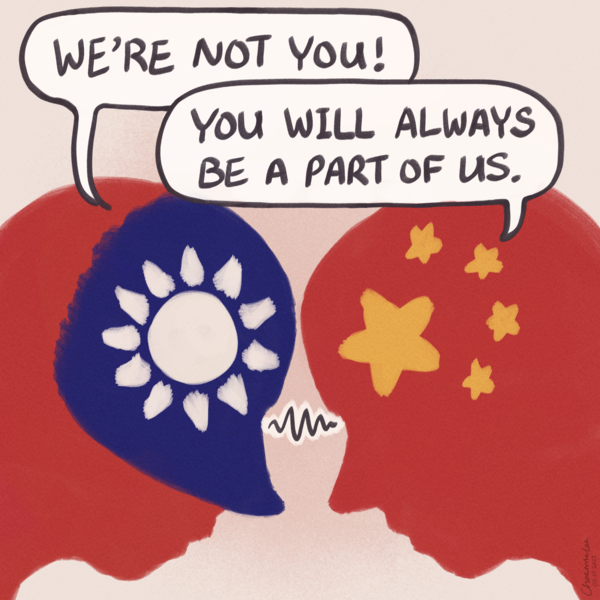Boiling Point: The Strained Relationship Between China and Taiwan
As Taiwan moves toward independence, signs of possible conflict are troubling the Taiwan Strait. In this Debate, we explore the plausibility of military conflict between Taiwan and China occurring in the near future. Will diplomacy prevail, or will we see the oft-predicted open warfare unfold? The two countries are clearly at a critical juncture in history.
Tensions have been rising in the Taiwan Strait. Both China and Taiwan are making predictions on when

, not if, a war will break out. Conflict in the East China Sea has always been a possibility due to the fundamental divide between the two nation’s positions. But as China pursues unification more aggressively and Taiwan drifts further apart from China, it seems that war has gone from an unlikely possibility to a probable reality.
As its official name — the Republic of China — suggests, Taiwan has close ties to China. After experiencing Chinese rule during the Qing dynasty, Taiwan was handed over to Imperial Japan before returning to Chinese control in 1945. During the 1949 Chinese Revolution, China’s nationalist party Kuomintang (KMT) fled to Taiwan and took control of the island. Taiwan has been governed independently ever since, with KMT holding rule over Taiwan most of the time.
Based on this complex relationship, China has been claiming ownership of Taiwan, viewing the island as a province. Their argument is that ever since Imperial Japan relinquished control of Taiwan, it has been under the rule of China. In their view, the KMT is merely a local authority. Meanwhile, Taiwan views itself as a separate nation. They assert that though Taiwan shares much of its history with China, it has never been under the control of the Chinese Communist Party.
The Taiwanese public’s views towards mainland China are mixed. According to 2022 surveys by the Election Study Center at National Chengchi University, most Taiwanese people think they should maintain the status quo with mainland China. Roughly two-thirds of Taiwanese people identify as solely Taiwanese, though a third still identify as both Taiwanese and Chinese. There is also a divide between Taiwan’s native residents and “mainlanders” who arrived with or after the KMT. Though the rise of the “Taiwanese identity” after the establishment of the DPP in 1986 decreased the ratio, Taiwanese people with mainland origins are more likely to identify as Chinese.
Nevertheless, political tides are shifting towards independence. Decreasing portions of the Taiwanese population retain a Chinese identity, while the relatively pro-China KMT has seen diminishing support over the past few years. The current party in power is the Democratic Progressive Party (DPP), which has been advocating for greater independence from China. President Tsai Ing-wen has been vocal in rejecting the 1992 Consensus which laid the grounds for cross-strait relations based on the agreement that there was “one China” — with each nation having different interpretations of the term. Her rejection of the consensus meant her rejection of the “one country, two systems” policy, spelling the end of the delicate relationship between China and Taiwan. By siding with the US in the China-US contest, Taiwan has also distanced itself from China on the international stage. In China, these actions have damaged public opinion on Taiwan.
China has demonstrated its willingness to use force if needed, especially when US-Taiwan exchanges are in question. Since 2021, a large number of Chinese military aircraft have been reported in Taiwan's Air Defence Zone. Last August, after the former Speaker of the US House Nancy Pelosi visited Taiwan, China conducted large-scale military drills around Taiwan that effectively caused a blockade. Taiwan criticized China for simulating an invasion. Despite the backlash, the Chinese military conducted “joint precision strike” simulations around Taiwan this April. This was in response to the meeting between President Tsai and Kevin McCarthy, the Speaker of the House. China introduced the use of carrier-based warplanes in this drill, making their threat felt despite the diminished scale of military mobilization. There were also standoffs between Taiwanese and Chinese vessels during these military operations, which may have easily escalated into an all-out conflict.
Actually initiating a military campaign is no easy feat. However, US intelligence indicates that President Xi is preparing for an invasion in 2027, while China’s expanding nuclear arsenal makes a possible attack all the more deadly. Meanwhile, Taiwan’s 2024 presidential elections may also become the deciding factor in an attack. The DDP’s candidate is Vice President William Lai, who once stated that he was a "Taiwan independence worker". If he wins the election, cross-strait relations are likely to deteriorate. Even spoken statements demonstrate the increased animosity between the two nations: Taiwan is more open about its pursuit of independence, while China is threatening punishment for the DPP, whom it refers to as “separatist forces”. With the loss of the 1992 Consensus, the relationship between China and Taiwan is yet undefined, and it is possible that it will only find stability in the aftermath of a war.

